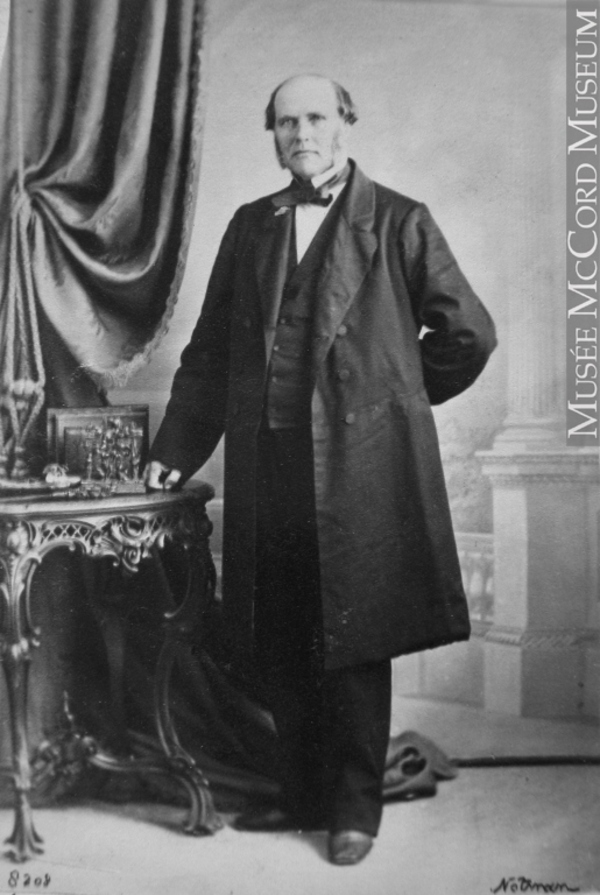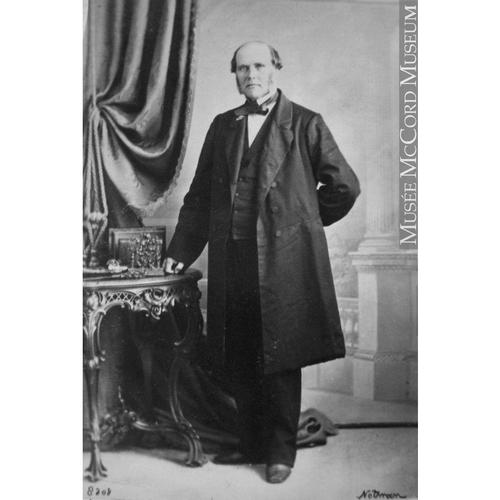
Source: Link
DOUGALL, JAMES, merchant, horticulturist, and politician; b. 21 Sept. 1810 at Paisley, Scotland, son of John Dougall, manufacturer and merchant, and Margaret Yool (Yuil); m. first in 1832 Susanne (1814–63), daughter of François Baby*, and they had five sons and two daughters; m. secondly in 1864 Elizabeth Maçon, née O’Neill, and they had two daughters; d. 5 April 1888 in Windsor, Ont.
In the mid 1820s James Dougall’s father, whose family had long been established in the muslin trade, decided that economic conditions in Scotland necessitated emigration to Canada. In 1826 Dougall sent his son John to Canada followed by James with a consignment of dry goods to sell. The two brothers established wholesale dry goods stores first at Quebec and then in Montreal. John Sr joined his sons and in 1828 he opened with James a branch in York (Toronto). A fire destroyed the York establishment and in mid 1830 John Sr and James moved to Sandwich (Windsor) where they opened the first general store in the region. John Jr, who remained in Montreal, was a partner in the business, named J. and J. Dougall. The location of the store, on the communication lines between Detroit and Upper Canada, guaranteed its success; John Sr returned to Montreal (he died in 1836) and James soon built a larger store and a wharf. His marriage, in 1832, connected him to some of the political and commercial leaders of the district, including James Baby* and William Hands. About 1834 Dougall became the agent for the Commercial Bank of the Midland District, and in 1837 he was appointed a magistrate and notary public, posts he retained for the rest of his life. According to tradition, Dougall was responsible for choosing the name of Windsor in 1836.
In January 1838, shortly after the outbreak of the rebellions, Upper Canada was threatened by a Patriot invasion from Detroit under Dr Edward Alexander Theller*. To help in the defence of the region, Dougall loaned $12,000 to the defending forces to purchase arms, flour, and pork. He also provided $14,000 worth of clothing and blankets at cost. In December 1838 the Patriot army finally crossed the river into Canada, and Dougall, after removing $24,000 from his safe in case the store was looted, participated in the battle of Windsor under Colonel John Prince*. Although he did not support Prince’s decision to shoot prisoners taken in the battle, he did condone the action in later years.
Following the rebellion Dougall gave up the Commercial Bank agency, but shortly after became an agent of the People’s Bank (later purchased by the Bank of Montreal), and moved his residence to Anderdon Township in Essex County, just north of Amherstburg, where he operated a branch store. His estate, Rosebank, became noted for its crops and pure-bred cattle and horses imported from Scotland. In 1850 he opened the Windsor Nurseries. Throughout his life he wrote articles for various agricultural journals in the United States and for his brother’s papers, the Montreal Witness and the Daily Witness in New York.
By 1839 J. and J. Dougall had become a flourishing wholesale and retail business and operated two vessels. The firm became Dougall and Redpath in 1840 when John married the daughter of Montreal merchant John Redpath*. In 1842 James Dougall hired Charles Hunt* to expand the firm’s provision business, supplying meat to the British market and corn, biscuits, and fish to the Hudson’s Bay Company. The conversion of John, by 1832, and then James to the temperance cause, however, ended the lucrative liquor trade in their stores.
By the late 1840s the firm had overextended its credit in Montreal and was suffering following the depression of 1847. In a fire in downtown Windsor, on 16 April 1849, the firm lost buildings and goods valued at $25,000, only part of which were insured. Arrangements were made to repay creditors, however, and by 1853 R. G. Dun and Company was able to report “both good business men bear excellent characters & may be depended on for liabilities they will assume.”
In the early 1850s James had returned to Windsor, where a land boom accompanied the construction of the Great Western Railway. He developed the land owned by his father-in-law, and in 1856 he and Charles Hunt also purchased land and subdivided it. Although Dougall and Redpath had pulled through the worst of its difficulties from the 1840s it never regained its former prosperity. The partnership, which was heavily in debt, was dissolved in March 1858 but John and James remained responsible for its obligations. James then joined his sons, John and Francis, to form a new partnership which was moderately successful despite the current depression. The old debts, however, could not be paid off and by April 1865 James, brother John, and the new partnership were forced into bankruptcy with some $82,000 in unsecured debts, the Bank of Montreal being a large creditor. Discharge from bankruptcy was not granted until April 1869; James was then able to continue a nursery business on a limited scale, while his sons established their own store.
Dougall had always been active in community affairs. He was elected warden for Anderdon in 1845 and, after Windsor was incorporated as a village in 1854, sat on the first council. He was a member of the first town council in 1858 and the next year was elected mayor, an office he held until 1861. He sat as an alderman from 1863 to 1865 and was mayor for part of 1867 as well as the following two years. He also contributed to the development of educational facilities. In 1845 he had donated the funds for the construction of a school to educate both white and black children in Anderdon and later he built a schoolhouse opposite his Windsor residence. By the mid 1850s he had become a grammar school trustee and with the amalgamation of the school-boards in Windsor in 1864 he was elected chairman, an office he retained until his death 24 years later. He had less success in provincial politics, losing elections for the Legislative Council in 1856 and 1860.
After the passing of the Ontario Liquor Licence Act of 1876 [see Adam Crooks], Dougall was appointed to the provincial board of licence commissioners. He was also active in the Windsor Board of Trade, and served as its president for some years. He was frequently its delegate to the Dominion Board of Trade and gave papers on trade development on the Windsor frontier.
Dougall was a member of the Presbyterian Church in Windsor and also in Detroit where he had excellent social connections. When he died after a lingering illness, he left personal and business effects worth only $450. His career, however, is not summed up by his business difficulties, but rather by his funeral eulogy, which stated that a sketch of his life “in this section of country would be to relate the history of this Western Peninsula.”
James Dougall was the author of “Battle of Windsor: James Dougall’s account,” ed. Francis Cleary, Essex Hist. Soc., Papers and addresses (Windsor, Ont.), 2 ([1915]): 25–29; The Canadian fruit-culturist; or letters to an intending fruit grower . . . (Montreal, 1867); and “My recollections of Toronto forty years ago,” New Dominion Monthly (Montreal), July 1869: 1–4. A Descriptive catalogue of fruit trees, grape vines, small fruits, &c., cultivated and for sale at the Windsor Nurseries, Windsor, Ontario, Canada, established 1850, James Dougall, proprietor (Montreal, 1874) (copy at AO) was also published.
AO, Hiram Walker Hist. Museum coll., 20–135 (G. F. Macdonald papers). Baker Library, R. G. Dun & Co. credit ledger, Canada, 15: 13, 24–25, 39. Essex County Surrogate Court (Windsor), grant book H, no.471 (will of James Dougall; inventory of estate, 23 July 1888). PAM, HBCA, D.4. E. A. Theller, Canada in 1837–38 . . . (2v., Philadelphia and New York, 1841). Canadian Emigrant ([Windsor, Ont.]), 20 Sept. 1836. Northern Messenger and Sabbath-School Companion (Montreal), 24 Sept. 1886. Commemorative biographical record of the county of Essex, Ontario, containing biographical sketches of prominent and representative citizens and many of the early settled families (Toronto, 1905), 69, 137. Richardson Dougall, James Dougall of Glasgow (1699–1760) and his descendants through Dougall and McDougall lines in the United States and Canada (Ann Arbor, Mich., 1973), 3, 149–50, 159–62, 170–71, 174–75, 357. “Charles Hunt, 1820–1871,” ed. G. W. H. Bartram, Centennial review, 1967 (London, Ont., [1967]), 55–85. R. A. Douglas, “The battle of Windsor,” OH, 61 (1969): 137–52. J. M. Hitsman, “Please send us a garrison,” OH, 50 (1958): 189–92.
Cite This Article
Frederick H. Armstrong, “DOUGALL, JAMES,” in Dictionary of Canadian Biography, vol. 11, University of Toronto/Université Laval, 2003–, accessed December 16, 2025, https://www.biographi.ca/en/bio/dougall_james_11E.html.
The citation above shows the format for footnotes and endnotes according to the Chicago manual of style (16th edition). Information to be used in other citation formats:
| Permalink: | https://www.biographi.ca/en/bio/dougall_james_11E.html |
| Author of Article: | Frederick H. Armstrong |
| Title of Article: | DOUGALL, JAMES |
| Publication Name: | Dictionary of Canadian Biography, vol. 11 |
| Publisher: | University of Toronto/Université Laval |
| Year of publication: | 1982 |
| Year of revision: | 1982 |
| Access Date: | December 16, 2025 |



